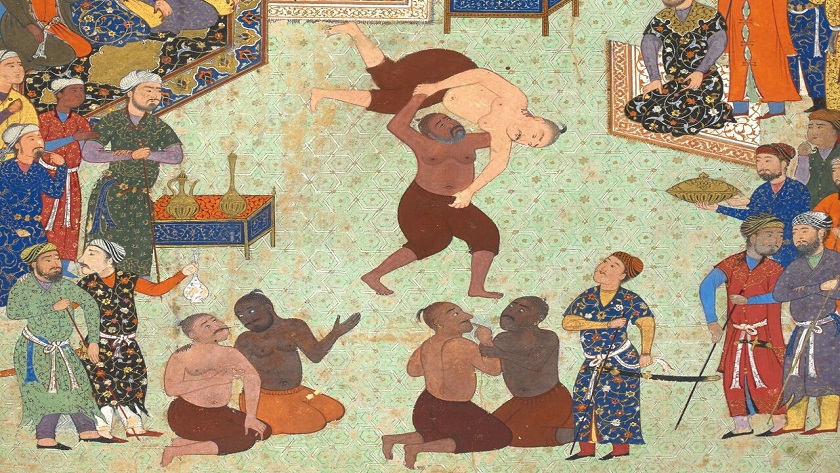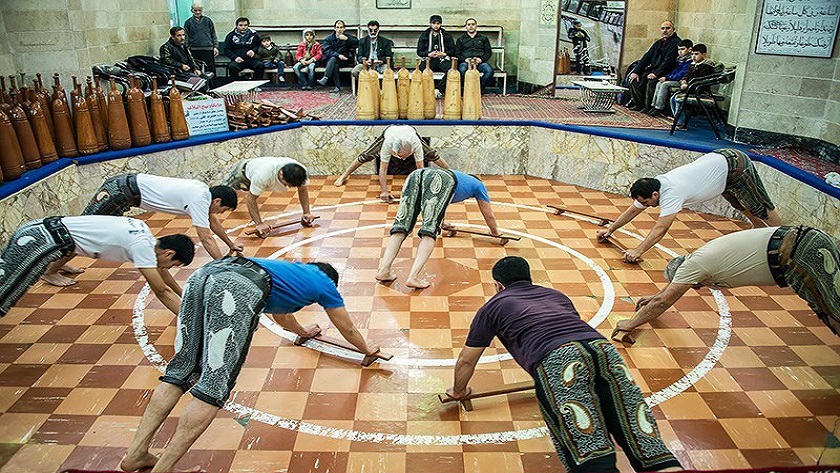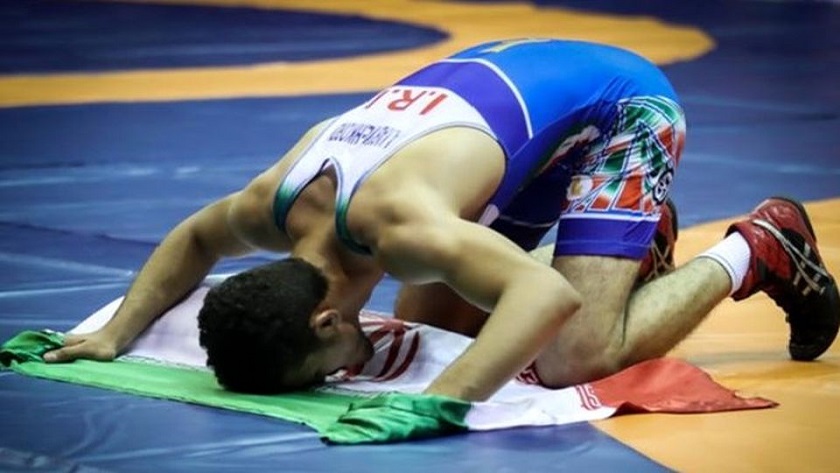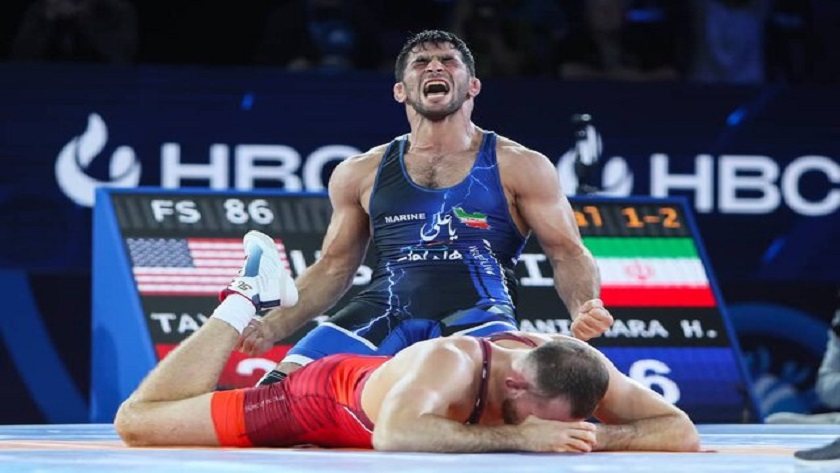Iran Press/ Iran news: Wrestling is one of the oldest sports in the world. “The first real traces of the development of wrestling date back to the times of the Sumerians, 5,000 years ago.” It is believed that “no sport is older or more widely distributed than wrestling”. Over time, different styles of wrestling were developed by ancient Egyptians, Romans, Greeks, Persians and other civilizations. As an ancient sport, traditional styles of wrestling are deeply embedded in Iran’s history and cultural heritage. Historically, wrestling went well beyond just being a sport. While many people are familiar with the sport, not all are aware of its religious connections and social effect in Iran.

Iranian wrestling or Koshti is a form of submission grappling that has been practiced since ancient times in Iran. A form today is Koshti Pahlavani practiced in the zurkhaneh (strength house). while regional variations differ from one province to another. Olympic freestyle wrestling is often referred to as the first sport of Iran.
Wrestling in Iran, like weightlifting, can be traced to the ancient Persian sport of Varzesh-e-Bastani, which translates to "ancient sport."Traditionally the sport was seen as a way to promote "inner strength through outer strength." Those involved were meant to embody kindness and humility while defending the society from "sinfulness."
Related News:
Iran wins four gold medals in Asian Wrestling Championship
Traditional Iranian wrestling (Koshti) dates back to ancient Persia and was said to have been practiced by Rustam, the mythological Iranian hero of the Shahnameh epic. While folk styles were practiced for sport by every ethnic group in various provinces, grappling for combat was considered the particular specialty of the zourkhāneh. The original purpose of these institutions was to train men as warriors and instill in them a sense of national pride in anticipation of the coming battles. The Mithrāic design and rituals of these academies bear testament to its Parthian origin (132 BCE – 226 CE). The zourkhaneh system of training is what is now known as Varzesh-e Bastani, and its particular form of wrestling was called Koshti Pahlevani, after the Parthian word Pahlevan meaning hero.

What has dominated wrestling all over Iran is not only its physical and sporting aspects, but also its spirit of chivalry and bravery, and its motivation for physical fitness in the face of various events, including hand-to-hand combat and the defense of the realm and standing against arrogant.
Iranian local variants of wrestling are known by various names and each of them has a special status for itself and the most famous of them are Kurdish style, Turkmen style, Gilaki style, and ancient style which is practiced in Zurkhaneh (strength house).
Related News:
Iran gains new seat in UWW
The first wrestling club was opened in 1921 in Tehran. It was in this period that wrestling became a global sport and its international regulations were defined. As such, Iranian wrestling moved to the next level by adopting the new styles and customs of wrestling to boost its high-held wrestling tradition in its society. This shift happened at the end of the 1930s. In 1938, Masoud Pahlavan-Neshan started training wrestlers in freestyle and Greco-Roman wrestling in Isfahan. The first national competition in freestyle wrestling took place in 1939 in Tehran’s Amjadieh sports club. However, the Second World War brought a halt to normal life, including wrestling, when Iran was occupied by the Russian and British armies in a common military plan.

After the war, wrestling started to grow again. The first international team to compete in Iran in 1947 was Turkey. And in 1948, Iran’s wrestling team took part in the London Olympics for the first time. Iran’s first participation in the World Championships was in the first freestyle event held in 1951 in Helsinki, Finland. Although Iran failed to make much of an impression on that occasion, it would go on to make its mark in the decades to come.
Related News:
US refuses issuance of visa for head of Iran's Werstling Fderation
In its second participation in the World Championships in 1954 in Japan, Iran’s national team came third, winning two golds and one silver medal. Towfigh Jahanbakhsh and Abbas Zandi won the gold medals. The Iranian team continued making history, coming first in five World Championships in freestyle (1959 in Yokohama, Japan; 1965 in Manchester, England; 1998 and 2002 in Tehran, Iran; and 2013 in Budapest, Hungary).
Related News:
Iran emerges victorious in Takhti World Cup wrestling competition
Iran also won the World Championship in Greco-Roman wrestling in Tashkent, Uzbekistan. During this period, Iran introduced some of the finest wrestlers to the world, with three of them named in the top 20 wrestlers of all time announced in 2000 by the World Wrestling Federation: Abdullah Movahhed, Gholam Reza Takhti and Rasool Khadem. But it is Hamid Sourian, who won six golds in World Championships and one gold in the 2012 London Olympics, who is considered Iran’s most celebrated wrestler. In fact, Iran produced so many new wrestling champions during the 2000s and 2010s that the period was dubbed a renaissance for the sport.

Among the Iranian freestyle wrestlers and wrestlers who have won medals in the World Championships and the Olympic Games, we can mention the following familiar names: Gholamreza Takhti - Abbas Zandi - Habibi - Seifpour - Mohammad Ali Sanatkaran - Mansour Mehdizadeh - Abdullah Movahed - Ebrahim Javadi - Shamsuddin Seyed Abbasi - Mohsen Farahvashi - Mansour Barzegar - Mohammad Reza Navai - Ramadan Khedr - Reza Sokhteh Sarai - Mohammad Hossein Mohebbi - Majid Torkan - Askari Mohammadian - Alireza Soleimani - Khadem Brothers - Alireza Dabir - Heidari and Hasan Yazdani.
219
Read More:
Iran freestyle team 2nd in 2021 U23 World Wrestling Championships
Yazdani becomes member of United World Wrestling Athletes Commission
Ashkan Salehian

